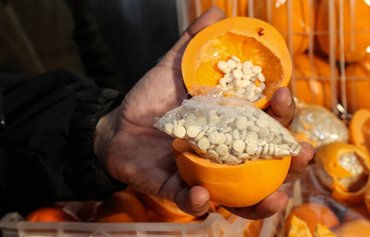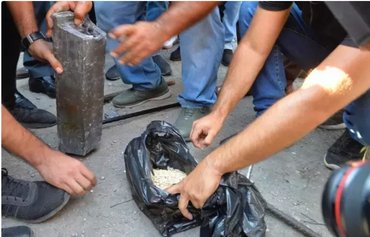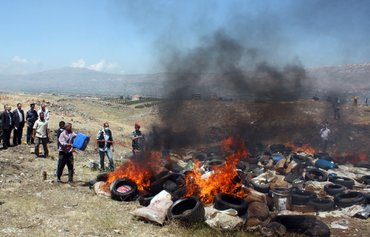Lebanese forces have stepped up their pursuit of drug dealers in the Bekaa Valley and Beirut's southern suburbs, areas where Hizbullah has a strong presence, in response to complaints about the proliferation of Captagon pills.
The Lebanese army conducted a June 17th raid in southern Beirut's al-Ramel al-Aali district, killing Samir Munther and injuring Mahmoud Zreiq, who were wanted in connection with assault and drug trafficking offenses.
The army said it had seized weapons, ammunition and drugs that were found in their possession.
Drug trafficking has been a growing problem in Beirut's southern suburbs, Higher Islamic Shia Council member Sheikh Abbas Zgheib said earlier this year.
"There is a major problem that is getting worse every day in the southern suburb in general and Hay al-Sellum district in particular, namely drug trafficking, which is being carried out in the streets," he said.
In early February, leaflets were distributed in south Beirut by a group calling itself the "Brigade of the Oppressed", accusing those who profit from drugs as being no better than the "Islamic State of Iraq and Syria" (ISIS).
"You are those who terrified and horrified our people and struck fear in the hearts of our children, women and elders, and shall receive the most severe punishment and retribution," the leaflet read.
Captagon use widespread
Hizbullah, the former al-Nusra Front (ANF) and ISIS are the main players in the manufacture and trafficking of Captagon and other illegal drugs, said Riad Tawq, an investigative journalist who covers security issues.
"At the end of 2012 and in early 2013, ISIS and ANF relied on the sale of crude oil as their main source of funding for their operations," he told Al-Mashareq.
They turned to the manufacture of Captagon after coalition forces targeted oil infrastructure and convoys and this source of revenue dried up, he said.
"The manufacture of Captagon does not require an extraordinary effort" and is not costly to produce, Tawq said.
"These terrorist groups manufacture Captagon not only for profit and trafficking in the Gulf states, where one pill is sold for between $10 and $20, but also for use by some of them as a sexual stimulant," he said.
The drug, a type of amphetamine, induces a sense of euphoria and keeps the user alert for long stretches, which makes it popular with fighters, he added.
Hizbullah-dominated trade
French customs officials on May 30th said they had intercepted 135 kilogrammes of Captagon this year at Charles de Gaulle Airport, AFP reported.
"It is the first time that this drug has been seized in France," the customs agency said in a statement, noting that the pill is especially being used in the Middle East.
Customs officials at the Paris airport also discovered 350,000 Captagon pills weighing 70 kilogrammes on January 4th, hidden among industrial moulds exported from Lebanon and apparently heading for the Czech Republic.
Captagon trafficking is mostly conducted by traders in the Hizbullah-dominated Baalbek and Hermel regions, Tawq said.
"They are basically drug traders who took up the Captagon trade," he said. "They are the only ones who can provide Captagon factories and know the smuggling networks."
Hizbullah-linked operatives have been arrested on drug trafficking charges in a number of countries in recent years, exposing a large revenue-generating network that has provided funding to the party.
Reports detailing these sting operations, which often involve more than one country, reveal the Iran-backed party has used millions of dollars in revenue from the illegal drug trade to purchase weapons to support its activities in Syria.

![A general view of Hermel in the Bekaa Valley. Captagon trafficking is mostly conducted by traders in areas where Hizbullah has a strong presence. [Photo circulated on social media]](/cnmi_di/images/2017/07/04/8611-Lebanon-Baalbeck-Hermel-600_384.jpg)






